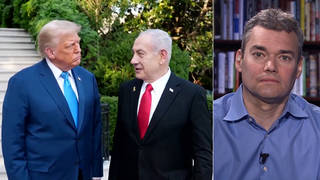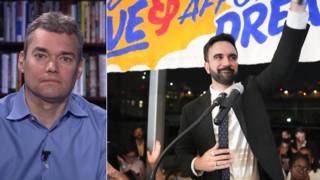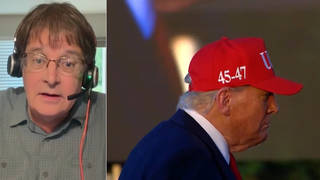
Topics
Guests
- Arun Guptareporter and editor at The Indypendent newspaper and whose email to friends and colleagues helped inspire today’s protest on Wall Street.
Among the more than 100 protests against the $700 bailout plan is a rally today on Wall Street. We speak to Arun Gupta, a reporter/editor at The Indypendent newspaper, whose email to friends and colleagues helped inspire the protest. Participants are planning on bringing their own personal, unwanted “junk” to illustrate what they call the federal bailout of Wall Street’s worthless securities. [includes rush transcript]
Transcript
AMY GOODMAN: Well, Ralph Nader, something that isn’t vague are the emerging rallies against Wall Street bailout that are being held today in over a hundred cities. In Washington, protesters are gathering outside the Treasury Department at 4:00 p.m. Here in New York, a protest is set for 4:00 p.m., as well, in Bowling Green Park near Wall Street.
The day of action has been partly inspired by an email sent out Monday by New York journalist Arun Gupta. In the email, Gupta described the bailout as the biggest robbery in world history. Arun Gupta is a reporter and editor at The Indypendent newspaper here in New York. He joins us in the firehouse.
You’ve just been written up in BusinessWeek. Talk about this letter. Talk about what you are putting out there.
ARUN GUPTA: Well, I do a good bit of economic writing, and I was trying to decipher the plan this weekend, and it became quickly apparent to me that this is a financial September 11th, that the Bush administration was trying to use the shock of this crisis, the self-induced crisis in this case, to ram through legislation that was highly ill-considered in terms of the actual economic merits, on the one hand, and then, on the other hand, it was this extreme power grab that would give these huge sweeping new powers to the Treasury Department.
So I wrote up this email. I sat on it overnight, because I was hesitant to send it out. I’m a journalist, not an organizer. But after talking with a few people, they felt I should send it out, so I sent it out to about 150 activists, organizers and media folks that I know in New York City. And it just exploded. You know, I don’t take any special credit for it. I was just tapping into this huge amount of anger and resentment that was out there.
JUAN GONZALEZ: Now, when you say “exploded,” what was the response?
ARUN GUPTA: Well, I talked to people who, within one hour of me sending it out and then them — I encouraged people, “Please forward widely.” They told me that within less than an hour, they had received it back from five or six different people. By the end of the day, apparently, a lot of big groups started jumping on it, including unions. By the next day, it was being endorsed and variations were being forwarded by True Majority, Code Pink, United for Peace and Justice. And so, it was just — it really showed the power of the internet in a particular moment.
AMY GOODMAN: So, talk about these protests that are taking place around the country.
ARUN GUPTA: Well, it started, as you know — the idea is like gather in Wall Street, and I thought maybe it would be a dozen people, and we’d be standing on the sidewalk. But now it looks like there will be hundreds, even possibly thousands. And then, True Majority picked up the call, along with United for Peace and Justice, one of the main antiwar groups, and they said, you know, “Let’s have these day of actions around the country.”
So, all over the country now, there are going to be protests in various financial centers. I’ve been getting emails from people, you know, from every single corner of the United States, asking, you know, “What’s going on? How do we plug in?” And so, we’re just trying to point them to these websites. It’s like, look, here’s a list of the protests, or you can plan your own event. And this is really coming from across the political spectrum.
JUAN GONZALEZ: And as you said in your email, this is leaderless, and no main organization is in charge or no individual is in charge. Everyone is just participating themselves.
ARUN GUPTA: That’s what’s great about it. You know, when people say, “Who’s organizing this?” I say, “No one and everyone.” This was just a call to self-organize. And, you know, it’s like I’m just going to show up there as just one more person who’s against this ridiculous bailout, this giveaway to the rich.
AMY GOODMAN: Ralph Nader, who is Henry Paulson? I mean, we know he worked for Nixon, was the aide to John Ehrlichman, the ex-con, the man who went to jail; then went off to Goldman Sachs; he and Alan Greenspan still being considered the economic wise men, even though this all happened under their watch.
RALPH NADER: That’s when you know the system is decayed and corrupt, that the people who brought us this disaster — Robert Rubin, with Bill Clinton pushing through the financial deregulation monster in 1999, which we opposed, which opened the gates for this kind of wild speculation and this casino capitalism, is still an adviser. He’s an adviser to Barack Obama. He’s an adviser to members of Congress. Henry Paulson cashed out at Goldman Sachs in 2006 a half-a-billion dollars. And now he goes to Washington to bail out his buddies.
The public outrage out there is really enormous. The calls coming into C-SPAN yesterday were overwhelmingly against this bailout, this outrageous inequity, this double standard between the guys at the top and the people who are going to have to pay the bills under this bailout, the taxpayers and the consumers.
Mr. Gupta is right in the sense that this is leaderless, but it’s got to be more than just a rally of protests. It’s got to demand something. It’s got to be focused. Otherwise, it will fritter away. We’ve had rallies on Wall Street. It’s a great place to have rallies. You can really congregate a lot of people, and the Wall Street guys look out the window, and they can see the people are coming.
But the first step is to slow down Congress. Once this bill is passed — and it’s a blanket bill. It’s only four pages, Amy, four pages of a $700 billion blank check, transferring congressional authority wholesale, and I think unconstitutionally, to the White House, King George IV at work again. Once it passes, then the chance for comprehensive regulation and all the other changes to make Wall Street accountable, instead of allow Wall Street to create a corporate state or what Franklin Delano Roosevelt called fascism, which is government controlled by private economic power, represented by people like Henry Paulson — once this happens, it’s not going to be reversible.
JUAN GONZALEZ: And Ralph, what about the homeowners who were at the center of this crisis in foreclosure? A million Americans have lost their homes in recent years. There seems to be still no clear sense that any kind of bill will actually provide clear relief for people facing the loss of their homes.
RALPH NADER: You’re absolutely right, because Barney Frank was asked about that last night after the hearing, and he said, “This is a money proposition, if you’re going to deal with the homeowners. It’s not my Banking Committee; it’s Charlie Rangel’s House Ways and Means.” In other words, there’s nothing in this bill for homeowners. There’s everything in this bill to bail out the bankers who actually created this problem with these out-of-control speculative financial instruments.
AMY GOODMAN: Cynthia McKinney has offered to debate Barack Obama if he’s the only one who shows up at Ole Miss tomorrow. Are you also going to make that offer? And, Ralph Nader, would you consider, given the stakes of this election, encouraging your supporters in swing states to vote for Barack Obama?
RALPH NADER: Well, first, I’d be very happy to sit in the seat emptied by John McCain. But I think the stage can handle the only — only six presidential candidates. There aren’t enough electoral colleges to theoretically win the election. And second, I’m not at all impressed by Barack Obama’s positions on this so-called bailout. It’s just rhetoric. His Senate record has not reflected that at all.
As we campaign around the country — we’re now in forty-five states plus the District of Columbia, and we’re running five, six, seven percent in the polls, which is equivalent to nine, ten million eligible voters — we are going to try to rouse the public in a specific way: laser-beam focus on their senators and representatives. When these senators and representatives, if they allow this bailout deal in this general, vague manner to pass, when they go back home, they’re going to hit hornets’ nest. This is a situation where it doesn’t matter whether the people back home are Republicans, Democrats, Greens, Libertarians, Nader-Gonzalez supporters. There’s such a deep sense of betrayal, of panic, of stampede, of surrender, of cowardliness in Congress, that it’s going to affect the election and the turnout.
I’d like Barack Obama, actually, to support the Nader-Gonzalez ticket.
AMY GOODMAN: Finally, Arun Gupta, people are bringing old junk to the protest today — records, old clothes, things they don’t want —- to symbolize…?
ARUN GUPTA: That’s one of the themes, cash for trash, which is how this bailout bill is being characterized -— in other words, that the government is giving the taxpayers’ good money for these worthless securities. So, many protesters are saying, well, let’s bring our own trash to Wall Street. We’ll create a junk pile and then ask the government to bail us out.
AMY GOODMAN: We’re going to leave it there. Arun Gupta is the reporter and editor of The Indypendent newspaper here in New York, organizer of today’s protest on Wall Street. There will be more than a hundred other protests around the country. We’ll report on them tomorrow. Ralph Nader, Independent candidate for president, speaking to us on the campaign trail in Pittsburgh.













Media Options